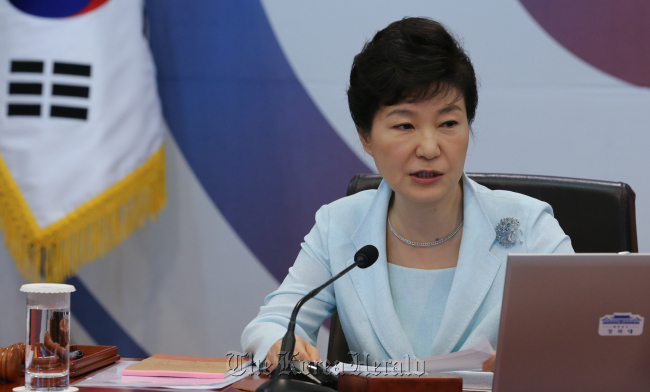President Park Geun-hye on Tuesday touted a recent breakthrough between the two Koreas, saying its thorough implementation starting with a fresh round of reunions of separated families would bring the peninsula closer to lasting peace and eventually a unification.
The sides are scheduled for a working-level meeting on Sept. 7 at the border village of Panmunjeom to arrange the family reunions, following their three-day high-level talks that ended last Tuesday.
“If we safeguard the hard-won agreement, we will be able to break the vicious cycle of tension that has persisted throughout the 70-year division, and move toward a path of peace and unification on the peninsula,” the president said during a Cabinet meeting at Cheong Wa Dae.
“Before all, I hope that the family reunions will take place without setbacks so that the aging separated families can fulfill their long-cherished wishes. We should open the door wide for their exchanges starting with this forthcoming session.”
 |
President Park Geun-hye speaks at a Cabinet meeting on Tuesday at Cheong Wa Dae. (Yonhap) |
The marathon negotiations salvaged the peninsula from the verge of an armed clash. Seoul officials have been trumpeting the six-point accord as a milestone enshrining Pyongyang’s apology for a recent border land mine attack and steps to ward off a relapse, despite lingering controversy over its interpretation.
While pledging to focus on cranking up the economy and reform plans such as on labor, education and finance, Park praised the 86 young soldiers who had requested to delay their discharge from the military as cross-border tension hit new highs.
Despite the diminishing strain, Vice Defense Minister Baek Seung-joo remained adamant that the latest fence-mending dialogue could rather boost the rationale for the Kim Jong-un regime to press ahead with a major provocation to coincide with its planned celebration of the 70th anniversary of the launch of the ruling Workers’ Party on Oct. 10.
“The possibility that the North will stage a strategic provocation such as a long-range ballistic missile launch or nuclear test has increased somewhat since the agreement,” Baek said in an interview with Kyodo News.
“That’s because many people say that the agreement left North Korea with egg on its face,” he added, vowing to employ “all retaliatory steps including a restart of propaganda broadcasts” along the Demilitarized Zone in the event of a provocation.
His unrefined choice of words aside, the remarks sparked controversy as they run counter to the burgeoning mood for long-awaited reconciliation and do not reflect the overall government assessment, Defense Ministry officials said.
The October event remains set to be a barometer for future inter-Korean ties -- and the core of the recent breakthrough. The possibility of a provocation was initially floated by Defense Minister Han Min-koo months ago but Seoul officials appear to have been refraining from making comments that potentially provoke Pyongyang.
Ministry spokesperson Kim Min-seok sought to downplay Baek’s remarks, saying they were not from “high-level intelligence” but meant to be a “general statement” based on outside experts.
By Shin Hyon-hee (
heeshin@heraldcorp.com)








